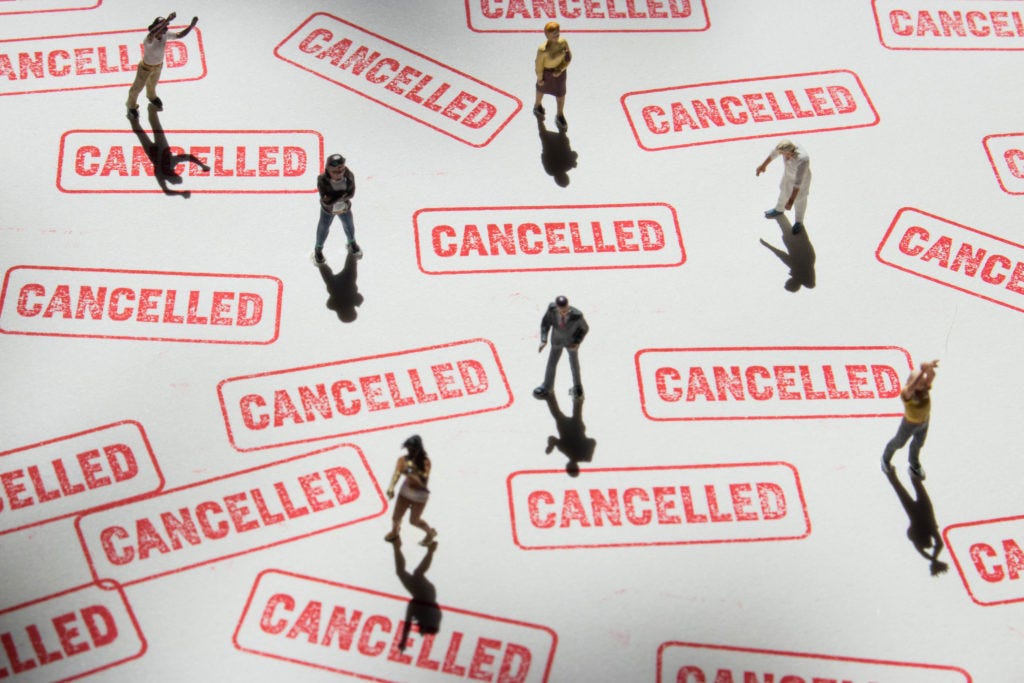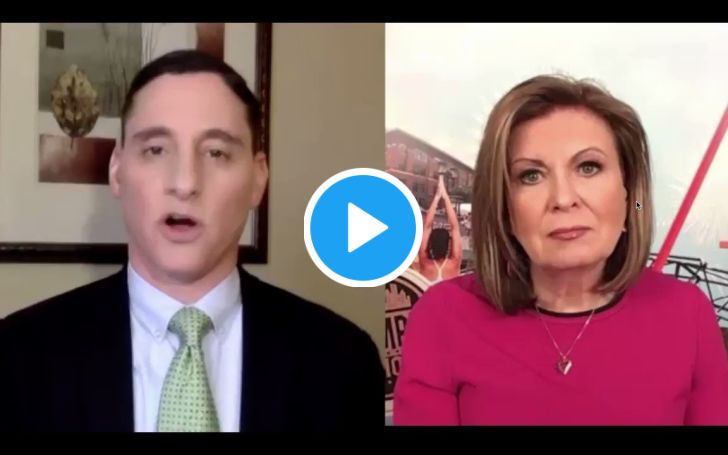1. On Moderation in Cancellation
For those who don’t know, I had some experience with “cancel culture” back during my time as an oppo research man. While all cancellations are alike, none are exactly the same and the details in this instance are complicated. Suffice it to say that some of the heat I got I deserved, some of it I didn’t, but as a result I did some reflection, quit doing some of the work I didn’t really feel good about in the first place, and after a rough patch am better off now than I’ve ever been. (I talked about this at a bit more length with Matt Lewis at the 30 minute mark of this podcast if you want more in depth reflection on this point.)
And I guess since you are reading about this in my newsletter and I’m pointing you to a podcast at another publication where I talked about it, then it wasn’t really a “cancellation” per se. Which is why I bring it up.
My situation is a prime example of how the “cancel culture” conversation has been degraded by the conflation of one real problem (normal people feeling like they can’t say their opinions without being fired—or worse, that they’ll get fired for the old opinions) with two not real problems: (1) public figures being criticized for something they’ve done (hi Andrew Cuomo, you have not been cancelled) and (2) the supposed “stifling” of political speech online (which is somehow occurring during a historic high-water mark for political speech).
Decoupling these matters is the only way that we can begin to address the real problem. But the people who are obsessed with “cancel culture” keep commingling them, for self-serving reasons. While the people who are pro-cancellation— or at least anti-anti-cancellation—use the stupid non-cancellations as a shield to pretend the problems don’t exist at all.
Once again, our ideological incentive structures aren’t doing us any favors.
Teen Vogue’s decision to “part ways” with Alexi McCammond before she began the editorship she was hired for—because of some offensive tweets she sent as a teenager—isn’t going to end her life. Alexi is extremely talented, driven, and charming. She’s been through tougher things than this. She’ll come out stronger.
But her resilience doesn’t make the way she was treated any better. And it doesn’t absolve the journalists at the New York Times from connecting some dumb tweets she sent when she was a hungover freshman in college—and that she apologized for publicly two years ago—to the mass murder of Asian women in Georgia last week. (Seriously, they did that. Which is either unbelievably dumb or wildly irresponsible.)
Alexi’s situation matters because it is a high-profile example of the real problem.
The reckless and unforgiving way she was treated by those with power and influence under the guise of advancing “justice” and “equity” in ways that are neither just nor equitable.
Preventing a black woman from a working class background from becoming the editor of a teen fashion magazine over her college tweets does not serve any of the social justice goals those pushing this claim to be fighting for. And similar injustice has ruined working people who don’t have the platform or the wherewithal to rebound from it like she will.
Fear of these types of cancellations have a chilling effect on speech in workplaces, high schools and colleges, and in spaces where community members of different backgrounds ought to be intermingling their ideas, cultures, and perspectives.
I have heard multiple, unpublicized first-hand stories of professors who have been pushed out of jobs because of “controversies” over extremely innocuous political speech. (In one of these instances it was an anti-Trump employee at a conservative college—the urge to cancel comes from both directions.)
But despite all of this evidence of inequitable real world harm there continues to be a sense by some progressives that this is only about “accountability.”
Accountability sounds nice. It’s not controversial. If you do something stupid and get criticized—or even fired for it—that’s not “cancel culture.” That’s how life should work.
But life should also leave room for people to be granted the grace to grow, to learn from mistakes, to gain empathy and perspective, to become their better selves. That’s the right thing to do, but it’s also the useful thing to do, it aligns the incentives for behavior with what we want from our society.
I’ve needed that grace to have the opportunity to do this and I presume that if you are a human reading this that at some time or place you have needed it as well (maybe you didn’t need as much grace as I did, but if you don’t mind let’s not keep score).
Journalists using massive public platforms to connect people’s long-past mistakes to contemporary crimes isn’t accountability. It’s tabloid smearing for clicks and narrative advancement.
An online mob targeting regular people and trying to ruin their lives over a 10 second video clip or a decade old tweet or for holding a “verboten” political opinion in the present day is not accountability. It’s mass hysteria.
On Thursday Night Bulwark this week we talked about the political concept of policing your own side. Well, the illiberal treatment of those who are targeted for imperfections isn’t going to end unless liberals blow the whistle on it rather than pretend it doesn’t exist for fear of giving the other team a win in our cosmic, never-ending cultural-political war.
2. What Cancel Culture Is Not
Okay so now that we’ve defined what cancel culture is, let’s talk about what it’s not. Bulwark contributor Christian Schneider had a nice summation here.
In other words: Effete White “Power” Fist Hawley. You have not been cancelled.
Neither has Josh Mandel, who was called out this week for his despicable and racist ploy to force Twitter to ban him so that he could clamber up onto the cancellation cross. Have a look, because this is pretty amazing.
Here’s Ohio political reporter Seth Richardson on March 12:
And here’s Josh Mandel one week later, on March 19:
So yeah these jabronis are full of shit. We all know this.
But it’s not just the politicians.
The most fanatical cancel culture cassandras are political commentators who claim that their voices are being silenced.
Diamond & Silk testified in Congress about a cancellation that never even happened! The whole thing was a hoax and the GOP House still made them the key witnesses. (You can see why people get skeptical of the whole deal when this is the example that’s put forward).
A while back the racist YouTube troll Steven Crowder made a big stir out of how he was cancelled for wearing a shirt calling people fags. (It’s always the manliest men who like to call people fags).
Glenn Greenwald and the intellectual dark web and other assorted folks in the Substack mafia love to obsess over the end of political speech.
But here’s the thing. Most of the people who complain about being censored are actually thriving. Never before in history have more cranks and contrarians with political views way outside the mainstream had a wider variety platforms—with larger audiences—available to share their ideas.
Let’s be clear about what’s happening: These crisis actors are using a problem affecting other people out in the real world in order to get attention by posturing as victims.
Twenty years ago, these people would have been sitting at home and writing five letters-to-the-editor per day and complaining to the bartender about how they aren’t getting published.
Today they’re stars. Even if they get banned from Twitter or YouTube, there are loads of other places where they can hawk their wares. The Substack ranking is full of people making six figures talking about the evils of censorship. Moobs Crowder is monetizing his “mug club” featuring a photoshopped picture of him from the early aughts. Diamond & Silk have a Newsmax contract and are on something called “chat dit.”
I wrote this week about Christian Walker who has amassed almost a half million TikTok followers by putting absolutely insane MAGA conspiracies and race baiting into a sassy package.
Yet somehow we don’t seem to be anywhere near the top of this market.
If you have out of the mainstream views and aspire to give your opinion for a living, that economic opportunity has never—in the whole of human history—been as open as it is now. In fact saying offensive stuff and then complaining about being cancelled seems to be the best way to build an audience for your Patreon/Substack/OnlyFans/Country Music Record. Getting “cancelled” can be a super effective biz-dev move.
As JVL wrote, anyone with a couple hundred bucks and the ability to set up a Hooli Box 3 can get on the internets, share their opinions, and charge the public for it.
(To my continued astonishment there are even people paying to get this very newsletter every day. And if you aren’t one of them, you could really show all those imaginary plutocrats who want to silence us by signing up today!!!)
My point here is that if we are going to get serious about stopping the oppressive hall monitors who stifle speech in corners of society where it should thrive, we need to stop lumping the real-life victims in with the big mouth pundits who are expanding their reach by yelling about how oppressed they are.
3. Stop the Steel Magnates
A bunch of aristocrats booked a private jet to see the Trump coup up close. Now they want to pretend it didn’t happen.
Did you hear John Dobbs flew his buddies to the capital on his private jet? A photo posted to the Instagram account of George Zanone III features the lineup: Dobbs, Zanone, Carter CampbellSr.,Vince Smith and his wife, Kaki Valerius Smith, brothers Dan and Bob McEwan, and one unidentified man mug against the backdrop of the nose of a private jet alongside the caption, “Go follow @memphispatriots,” plus a Washington, D.C., location tag. The photo disappeared from Zanone’s social media grid, otherwise a memorial to dead ducks and deer, but not before a few quietly horrified members of local society could screenshot it.
Cumulatively, the individuals in the photograph with the plane are worth millions and millions of dollars, with business interests that span the southeast: sizable stakes in auto dealerships, financial firms whose earnings rival those of Wall Street shops, a chunk of the Corky’s BBQ chain, major real estate developments, hospitality services with clients including Marriott and Hilton hotels, and registered “plantations,” which are used as hunt clubs. Their cohort is emblematic of a certain segment of rich, white American society where the so-called quiet part is cacophonous background noise—private schools, booster clubs, country clubs. In Memphis there is a black-tie ball and festival where men and women, including Dobbs, dress up as royalty and anoint one another “queens,” “princesses,” and “kings.” This society is for the manor-born, and the conservatives among it have little to do with the caricature of the down-on-their-luck, economically anxious Trump voter of media lore. To wit: In the aftermath of the “Stop the Steal” rally and Capitol riot, a two-time Olympic gold medalist, a state lawmaker, and a successful Texas real estate agent were among those swept up by law enforcement for their involvement.





